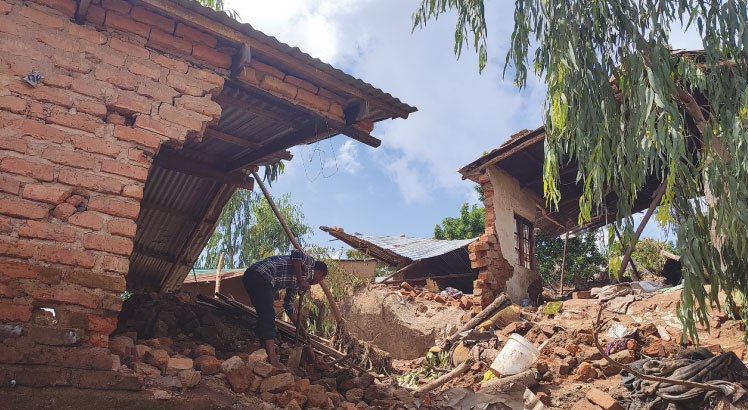Probing the drying Lake Chilwa
 Abel Mindozo of Mapila Village, Traditional Authority Mposa in Machinga has witnessed the drying up of Lake Chilwa more than two times in his life.
Abel Mindozo of Mapila Village, Traditional Authority Mposa in Machinga has witnessed the drying up of Lake Chilwa more than two times in his life.
“I’m surprised that this time around, the drying up is attracting many visitors to the lake,” he wonders.
Mindozo says the drying up of the lake was not a big deal in the past, since it offered an opportunity to local farmers to grow rice.
The 55-year-old adds that he heard nothing about environmental conservation and climate change.
“My parents told me the lake dried up in 1959 and took three years to come back to normal. Then, it dried up again after five years, then in 1970s and then in 1990s,” Mindozo recalls.
He explains that at Mposa beach, where about five kilometres of the lake dried up, people started making gardens for vegetables and other crops.
“Some are afraid of cultivation because they are not sure of how much rains the country will have this year,” says Mindozo, saying he now believes climate change and environmental degradation has greatly contributed to this.
Williams Likomba of Mapira Village, T/A Mposa in Machinga agrees. He believes people of Mposa and Lake Chilwa Basin catchment area have not been cautious about the environment; hence, the routine dry-up every five years or so.
“The trees on the catchment areas of the lake have been carelessly cut down and sold to fishers who use them to dry their fish and make boats,” he notes.
Regional director for Leadership for Environment and Development (Lead) Professor Sosten Chiotha says there is need to manage Zomba Plateau which is the catchment area for the lake.
“Vegetation of the plateau is very important, hence the need to replant more trees,” he said.
Chiotha noted that water on Lake Chilwa is always dirty because it is a shallow lake at less than two and half metres deep.
According to him, Lake Chilwa produces more fish per unit area than Lake Malawi.
Chiotha says: “The intensity of drying up is much higher this time around; hence, its link to climate change. The big deal about the drying up this time around is the fact that the country’s population growth is rapid.”
Malawi is one of the 15 population and climate change hot spot countries. According to a report by Population Action International, combined effects of climate change and rapid population growth are increasing environmental degradation and poverty levels in the countries.
“A higher demand for resources also leads to overexploitation of land, forests and fishing stocks. Between 1990 and 2010, Malawi lost about 17 percent of its forest cover, declining at an annual rate of one percent,” reads the report in part.
The report points out that the country does not have a climate change policy; hence, problems such as those of Lake Chilwa are coming in. It, therefore, recommends the integration of population interventions such as the need for family planning as one way of controlling rapid population growth and save the environment.





